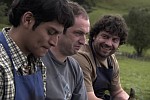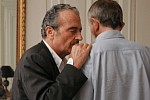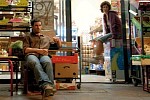 Shadows off the beaten path
Shadows off the beaten pathCHEF'S SPECIAL | THE GROCER'S SON
< < F O R E I G N > >
last update 23.Apr.09
See also: SHADOWS FILM FESTIVAL
 R E V I E W B Y R I C H C L I N E
R E V I E W B Y R I C H C L I N E MUST
MUST  SEE
SEE
with Joxean Bengoetxea, Christian Esquivel, Mamen Rivera, Leire Ucha, Pilar Rodríguez, Pako Revueltas, Eriz Alberdi, Pedro Otaegi, Unax Martín, Juancho Kerejeta, Jose Kruz Gurrutxaga

release Sp Jan.09 bigltff
09/Spain 2h08


 With remarkable insight, this unhurried drama beautifully captures the pace of life in an isolated Basque community in the Spanish Pyrenees. And even more than that, it has some potent things to say about culture and sexuality.
With remarkable insight, this unhurried drama beautifully captures the pace of life in an isolated Basque community in the Spanish Pyrenees. And even more than that, it has some potent things to say about culture and sexuality.
In a remote valley in northern Spain, Ander (Bengoetxea) is a middle-aged farmer living with his younger sister Arantxa (Ucha) and their sparky, aging mother (Rodriguez). There's not much in his life beyond working the land, but Arantxa's upcoming marriage to Iñaki (Alberdi) is keeping everyone preoccupied. When Ander breaks his leg, Iñaki hires the young Peruvian Jose (Esquivel) to help around the farm. Against all odds, Ander and Jose become friends, even sharing the local prostitute Reme (Rivera) with Ander's pal Peio (Revueltas). But it's clear that Ander and Jose are more attracted to each other.
Filmmaker Caston takes an astonishingly original approach to this story, patiently establishing the links between the characters and placing them firmly within their environment. As a result, the personalities and personal histories become extremely palpable as the story progresses, and the inter-relationships are charged both with warmth and humour. Adding to this, the cast members beautifully underplay their roles, drawing us deeply into their internal journeys. Frankly, even Brokeback Mountain didn't explore reluctantly emerging sexuality with this much tenderness.
The result is a film in which every character becomes thoroughly gripping. Bengoetxea portrays Ander's quietly dawning self-discovery with beautiful honesty. And the two outsiders played by Esquivel and Rivera are striking characters all their own. Jose has a past that we can only begin to understand, but it thoroughly informs his interaction with Ander. And Reme emerges as the film's most striking character: a woman pushed into a terrible situation by a macho society in which anything remotely against the grain is something to be feared.
Caston captures this on film with a grainy, dark beauty. The lush colours and gorgeous landscapes actually add layers of emotion to what's otherwise a somewhat dry, virtually silent film. These aren't very articulate people and, before now, they've never imagined that maybe they can make decisions about their own futures. As the film gets under their skin, it becomes deeply, thoroughly moving. We acutely recognise these internal shake-ups, realising that we've been there too. And maybe still are.
11.Feb.09 bff
 R E V I E W B Y R I C H C L I N E
R E V I E W B Y R I C H C L I N E Avant que J’Oublie
Avant que J’Oublie
with Jacques Nolot, Jean-Pol Dubois, Marc Rioufol, Bastien d'Asnières, Bruno Moneglia, Jean Pommier, David Kessler, Gaetano Weysen-Volli, Rémy Le Fur, Lyes Rabia, Lionel Goldstein, Bernard Herlem

release Fr 17.Oct.07,
US 18.Jul.08,
UK 17.Apr.09
07/France 1h48
CANNES FILM FEST
TORONTO FILM FEST

 A quietly contemplative film about a man looking back on his life, this funny and heartbreaking film features several surprising twists that make it well worth a look. Especially as it subtly makes some strong comments about society and culture.
A quietly contemplative film about a man looking back on his life, this funny and heartbreaking film features several surprising twists that make it well worth a look. Especially as it subtly makes some strong comments about society and culture.
Pierre (Nolot) is 60 years old and contemplating his mortality as he wakes up ill in the middle of the night. By day his life in Paris is more genteel, visiting his old friends (Dubois, Moneglia and Pommier) to talk about the good old days and also to discuss their sex lives. Pierre is an HIV-positive former rentboy, and he and his friends still hire escorts for sex, comparing notes and discussing their feelings. Pierre also sees a psychologist (Kessler) and contemplates suicide after the death of a beloved lover, whose family has stolen his inheritance.
As a writer-director, Nolot takes a matter-of-fact approach that makes the film feel eerily autobiographical. Pierre flatly understands what's going on around him; he has no illusions, and yet clings to the hope that here might be some justice in the world. Nolot plays him with such an off-handed honesty that it takes the breath away--both the wry humour and the dark shadows of emotion, plus a preening sexuality that lets us see the proud, beautiful man he still is inside.
There's not much plot to speak of, as the film is a series of encounters between Pierre and the people in his life. These conversations about life in the sex trade are relaxed and honest, touching on some extremely serious issues (including the fact that most clients are married and/or closeted). Nolot really opens himself up on screen, both in his acting and through his writing and directing.
His early encounter with a young escort (d'Asnieres) also provides the film's final sequence, in which Pierre is convinced to go in drag to Paris' red light district. It's shot in a single long take as Pierre finds his footing and makes the most of it. This is thoroughly unselfconscious filmmaking, touching on the daily indignities of ageing and illness, and the fact that this solitary life simply isn't what he expected.
7.Apr.09
 R E V I E W B Y R I C H C L I N E
R E V I E W B Y R I C H C L I N E Fuera de Carta
Fuera de Carta
scr Oriol Capel, Antonio Sánchez, David S Olivas, Nacho G Velilla
with Javier Cámara, Lola Dueñas, Fernando Tejero, Benjamín Vicuña, Chus Lampreave, Luis Varela, Junio Valverde, Alejandra Lorenzo, Alexandra Jiménez, Alberto Jo Lee, Cristina Marcos, Carlos Leal
 release Sp 11.Apr.08,
release Sp 11.Apr.08, UK Mar.09 llgff,
US Mar.09 ciff
08/Spain 1h51

 Even though it's a bit superficial, this Spanish comedy is full of energetic characters and hilarious situations. And while it feels sunny and silly, it also has a provocative edge to it.
Even though it's a bit superficial, this Spanish comedy is full of energetic characters and hilarious situations. And while it feels sunny and silly, it also has a provocative edge to it.
In a trendy Madrid restaurant, the gay owner-chef Maxi (Camara) is in a panic because a Michelin Guide writer is coming in. And his flatmate and maitre d' Alex (Duenas) is even more tightly wound after a complete love breakdown. Although both are distracted while flirting with the sexy Argentine ex-footballer Horacio (Vicuna) who moves in next door. Then Maxi finds out that his ex-wife is dying, which means he has to take in his surly 15-year-old son (Valverde) and pre-teen daughter (Lorenzo). All of this is happening at exactly the wrong time.
Director-cowriter Velilla skilfully gives the film an Almodovaran tone, using colourful set design, swooping cinematography and a cast of neurotic characters. This makes it somewhat exhausting, as everyone overreacts wildly to whatever happens. But it's also genuinely hilarious to watch the farce unfurl, even as the predictable plot groans into gear. It also helps to have some real issues--sudden parenthood, closeted sportsmen, interfering friends.
But the script kind of brushes these themes aside as it focuses on the snappy, sharp-tongued characters. Camara's fast-talking Maxi is both endearing and infuriating, far too out of touch with everyone around him. And he's such a hothead that you wonder how he could ever run a restaurant, especially when he sacks his loyal-but-troubled headwaiter (Tejero) without a moment's thought. But Camara's adept at creating bright, prickly characters, and he bounces hysterically off everyone around him, letting the whole cast bring their roles to life.
Each person has a journey to take, and it's a bit far-fetched when the screenwriters strain to bring all of the plot strands together in a big, wacky finale. But underneath the chaos, there's actually a solid story to keep us involved. Even as everything descends into madcap goofiness, there's one strong theme that emerges: if life makes you this crazy, perhaps you're putting all your energy in the wrong place.
10.Mar.09 llgff
 R E V I E W B Y R I C H C L I N E
R E V I E W B Y R I C H C L I N E Le Fils de l’Epicier
Le Fils de l’Epicier
scr Eric Guirado, Florence Vignon
with Nicolas Cazalé, Clotilde Hesme, Jeanne Goupil, Daniel Duval, Stéphan Guérin-Tillié, Liliane Rovère, Benoit Giros, Chad Chenouga, Paul Crauchet, Ludmila Ruoso, Gilles Chabrier, Jean-Luc Boucherot
 release Fr 15.Aug.07,
release Fr 15.Aug.07, US 6.Jun.08,
UK 24.Apr.09
07/France 1h36
 With an internalised perspective and a low-key approach, this warm French drama keeps us thoroughly engaged even though it has a tendency to smooth its rough edges with cute comedy.
With an internalised perspective and a low-key approach, this warm French drama keeps us thoroughly engaged even though it has a tendency to smooth its rough edges with cute comedy.
Antoine (Cazale) is a slacker in Paris who is snapped back to reality when his grumpy father (Duval) has a heart attack. While he recovers, Antoine returns to the village he left 10 years earlier to help his mother (Goupil) run the family grocery shop. He takes with him his flatmate Claire (Hesme), on whom he has an unrequited crush. She helps Antoine develop some patience with the eccentric customers on the delivery route, but his father and brother (Guerin-Tillie) will never see him as anything but a loser.
The hardest thing about this film is the unlikeable character at the centre. Antoine has such a chip on his shoulder that we want to slap him. He's a bit of an idiot, incapable of being nice to people or telling Claire how he feels. But as the story progresses, he begins to discover himself and starts to participate in the community around him. This transformation is played with subtlety and honesty by Cazale, as well as the actors around him. And none of the characters are remotely simplistic or predictable.
Director-cowriter Guirado fills the screen with extremely telling details, quiet observations and constant subtext. There is tension between everyone in this story, while Antoine's mother struggles to maintain the peace. We can see that Antoine has inherited his crankiness from his dad, and we begin to wonder if he'll end up as a nasty hermit like his brother, living in an unfinished house and not facing up to the facts of his own life.
But the film isn't quite that bleak, and offers an oddly hopeful ending. It also frequently stirs in comical touches that keep us smiling. This is a prodigal son story examining the long, slow path to discovering your place in the world after years of aimless indulgence. Even though the characters are a bit prickly, the film is tender, moody and ultimately sweet. With a gentle sting in its tail.
18.Dec.08


See also: SHADOWS FILM FESTIVAL
© 2009 by Rich Cline, Shadows
on the Wall